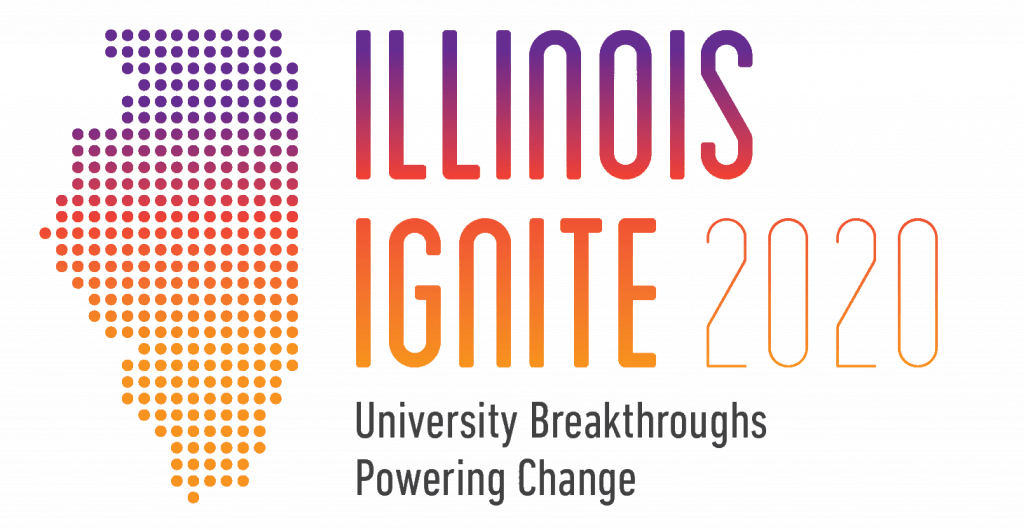Illinois Ignite: Researchers to Showcase Breakthroughs in Healthcare, Computing, and Advanced Manufacturing

Illinois Ignite 2020 will feature technologies and startups from the University of Chicago, Northwestern University, University of Illinois Urbana-Champaign, University of Illinois-Chicago, and Illinois Institute of Technology. The virtual showcase will focus on breakthroughs in healthcare, computing, advanced manufacturing, and more.
Pre-recorded presentations will be posted on September 24, 2020, and will remain live until October 9, 2020.
>> Register for the virtual event, here.
Learn more about the University of Chicago researchers presenting:
// Genetically Engineered Skin to Treat Disease, Promote Scarless Wound Healing, and More
The largest organ in the human body, skin is a robust system with great potential to support not only basic research, but to serve as a platform for stem cell engineering.
This is the focus of Xiaoyang Wu’s work, which is dedicated to understanding the dynamics, signaling, and clinical applications of skin stem cells. Wu has been working in the field for more than 30 years and is currently an associate professor in the Ben May Department of Cancer Research.
// The Future of Energy Storage: Bringing Batteries to the Molecular Scale
The increasing use of renewable energy and the adoption of electric vehicles among other advances are creating a significant need for inexpensive and long-lived energy storage devices.
While lithium-ion batteries are currently the status quo, researchers argue a new class of materials could enable store density and lifetimes “far beyond” today’s technology. An assistant professor in the department of chemistry, John Anderson is focused on developing fundamentally new and disruptive materials to realize dramatic improvements in battery performance and cost.
// Detecting and Monitoring Disease Using DNA-Nanotechnology
Advanced imaging probes are enabling University of Chicago researchers to predict patient responsivity to therapeutics and monitor the progression of diseases, such as Alzheimer’s.
By chemically profiling lysosomes in cells from Alzheimer’s patients, Yamuna Krishnan, aims to classify the disease into subtypes that can then be targeted with precise treatments. To enable this, Krishnan has developed a chemical imaging platform, which uses synthetic DNA strands that have been engineered to function in a specific way.
// Building Atomically Thin Circuits for Advanced Devices
The nature of Jiwoong Park’s work is multidisciplinary: trying to connect fundamental science with very challenging problems that do not have immediate solutions – “and there are plenty of them,” he said.
A professor in the department of chemistry and the Pritzker School of Molecular Engineering, Park focuses on the science and technology of nanomaterials, specifically two-dimensional layered materials.
// Researchers Light the Way for Minimally-Invasive Medical Devices, New Treatments
A team of University of Chicago scientists, led by Bozhi Tian, have pioneered a new technique that harnesses the power of light to stimulate various cells and tissue – an approach that has a range of applications in healthcare.
Several disease-treating devices rely on the electrical stimulation of neurons to treat diseases, such as Parkinson’s. However, the use of these devices is often high risk, as it requires either surgical implantation or permanent gene editing. Proposing a less invasive technique, Tian has developed an approach for designing semiconductor-based structures that when activated by light, initiate a response that can be targeted to specific cells.
Ravi Chugh is developing programming language technology for applications in software engineering and human-computer interaction.
Chugh, who joined the University in 2014, is “designing programming systems that enable a variety of users, both novice and advanced, to harness both the expressive power of programming and the cognitive efficiencies of GUI-based manipulation.”
// Using Nanotechnology to Deliver ‘Potentially Transformative’ Peptide-Based Therapeutics
James Labelle is developing therapies that modify the function of the immune system – by examining why, on a molecular level, some pediatric cancers are resistant to treatment.
The key goal of LaBelle’s research group at the University of Chicago is to dissect and target the proteins within cells that induce cancer cell death. The team is using peptides – portions of these proteins – as drugs and tools to discover specific molecular pathways in both normal and diseased cells.